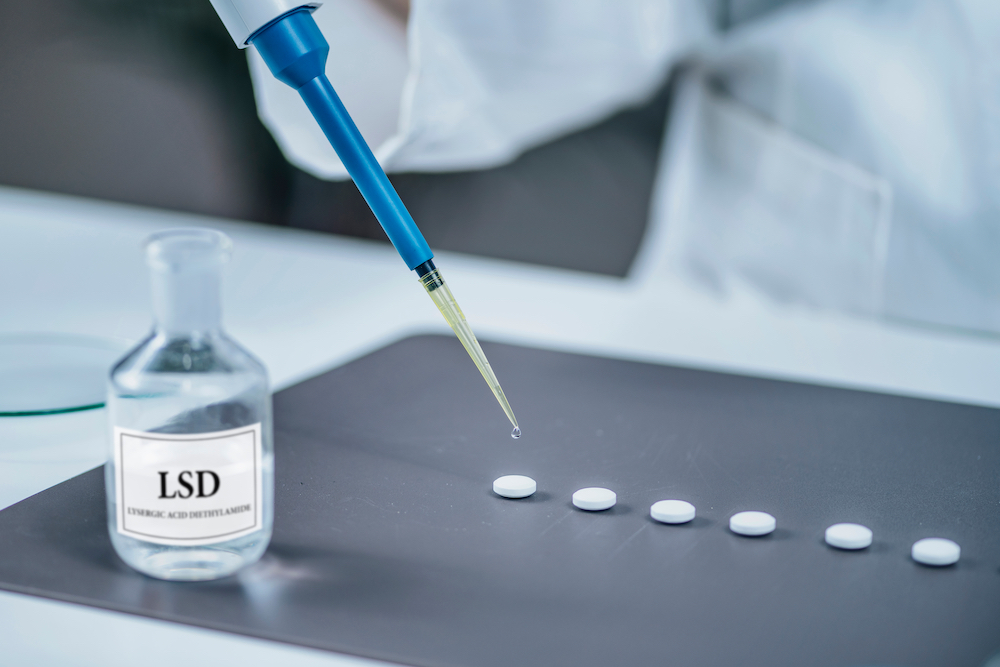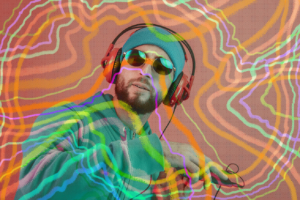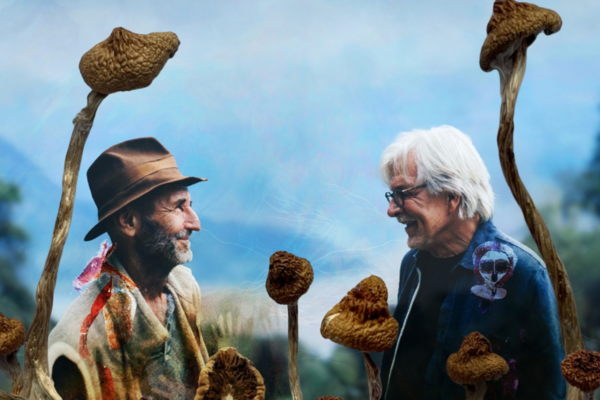
Just a few years ago, the promise of psychedelics being embraced by mainstream culture and lawmakers in the United States still seemed like a hopeful hallucination rather than a concrete reality. But now, two months into 2022, development after development across the country has made it pretty clear: psychedelics have once again arrived in American culture and this time, they’re here to stay.
Natural psychedelic substances found in plants and fungi have been used by Indigenous societies for millennia, and Westerners began embracing those as well as synthesized compounds, like LSD, starting in the 1950s. Research exploring psychedelic-assisted therapy exploded back then, with study after study showing potential to treat depression, anxiety, and addiction. Hollywood icon Cary Grant, for example, famously underwent dozens of LSD-therapy sessions to heal childhood trauma, and of course Harvard psychologists Timothy Leary and Richard Alpert (before becoming spiritual guru Ram Dass) did in-depth research before the drugs went from labs to the streets, fueling the ’60s hippie and anti-war movements. That didn’t jive with President Richard Nixon, so he launched the War on Drugs, scapegoating psychedelics as “public enemy number one,” and adding your favorite hallucinogens to schedule 1 of the Controlled Substances Act in 1970.
While underground psychedelic culture has been quietly thriving since that era, we can thank the tireless research of modern pioneers, whose scientific methods of study and clinical trials are convincing regulatory bodies, including the Drug Enforcement Agency and the U.S. Food and Drug Administration, to take psychedelics seriously as a potential answer to the ever-growing mental health crisis. But it takes a village to raise a movement. Writers, filmmakers, journalists, talk show hosts, actors, athletes, musicians, doctors, psychologists, nutritionists, and, well, just about anybody who has had a profound psychedelic experience, are also playing their part in raising collective awareness to end the stigma.
Every conversation helps, and those talks are happening a lot more frequently these days, culminating in a metaphorical snowball. It’s been slowly growing, picking up layers upon layers of densely packed flakes as those modern pioneers pushed through red tape, up a steep bureaucratic hill, until reaching a recent peak. Now it seems, to this observer at least, that the psychedelics movement has been pushed over the edge, rolling by the sheer force of gravity, growing with each revolution as a new hope for mental healthcare barrels down toward accessibility for the masses.
Psychedelic Spotlight has witnessed and reported on so many developments since launching in 2020, that an avalanche may be a more suitable metaphor to describe what’s coming, especially if projections for the industry to reach a $6.3 billion market value by 2026 are accurate. But since this is an article, not a book, here are just four recent signs that the psychedelics renaissance is truly unstoppable.
Psychedelics Are Among the Few Things Republicans and Democrats Can Agree On

The divide between left- and right-wing political ideologies, and the people that adhere to them, now seems deeper than ever. It doesn’t take a far walk down memory lane to debunk that perception, however. Before and after the Civil War, the United States has been full of strife, and the aforementioned psychedelic era of the late ’60s and early ’70s is a great example of ideological conflict that shook the streets. But still, in an era when Team Red and Team Blue can’t even agree on the realities of a global pandemic that has cost millions of lives, as well as the history and impact of systemic racism, or the catastrophes already arising out of climate change, it’s a pleasant surprise to see both Republican and Democratic lawmakers writing bills to support psychedelic legalization or decriminalization for therapeutic purposes, or at least more research into the subject.
California may decriminalize psychedelics this year, while Oregon is in the process of figuring out how to proceed with psychedelic regulations in wake of voters approving Measure 109 in November 2020, allowing for the “manufacture, delivery, and administration of psilocybin at supervised, licensed facilities.” In the U.S. cityscape, liberal strongholds Denver, Detroit, and Seattle have also passed legislation legalizing or decriminalizing natural psychedelics, like fungi-derived psilocybin.
But magic mushrooms aren’t just for Smurfs. Texas, one of the most “red” states on the map, passed a bill last June requiring the state to study the risks and benefits of psilocybin, MDMA, and ketamine for veterans, and conduct a clinical trial using psilocybin to treat veterans with PTSD. More recently, the Dell Medical School at the University of Texas at Austin announced the launch of the Center for Psychedelic Research and Therapy — the first center of its kind in the Lone Star State — and a sign that the Republican stronghold is poised to become a psychedelic research hub.
Meanwhile, two GOP lawmakers in Oklahoma recently introduced bills pushing for reform around psilocybin, and last fall, a Republican lawmaker in Pennsylvania introduced The Public Health Benefits of Psilocybin Act with the support of 9 Republicans and 10 Democrats. We kicked off the new year with this piece rounding up promising legislation, either up for vote or going into effect in 2022, and have since seen psychedelic policy proposals pop up in Missouri and Virginia, as well.
It’s honestly getting hard to keep up with at this point.
Perhaps National Institute on Drug Abuse Director Dr. Nora Volkow said it best: “I think, to a certain extent, with all the attention that the psychedelic drugs have attracted, the train has left the station and that people are going to start to use it. People are going to start to use it whether [the FDA] approves or not.”
Even Fox News Supports Psychedelics
We’ve seen every major news platform cover psychedelics in a positive light in the last few years, which has no doubt turned the tide of public opinion once shaped almost exclusively from anti-drug, fear-based propaganda. But watching a Fox News host welcome psychedelic researcher Matthew W. Johnson on the air to actually listen to the message without jumping in to question or demonize the topic felt like a major turning point.
Fox News is far from fair and balanced, with an undeniable right-wing spin on current events, designed to enforce the conservative perspective and empower its cultural grip. Despite the network’s talking heads frequently railing against “the mainstream media,” Fox News is a ratings juggernaut with massive influence over the minds of its loyal viewers, making it the most mainstream cable news network of our time, and therefore, one of the psychedelic movement’s greatest allies. If there is anybody on television that can convince conservative Boomers that psilocybin and LSD won’t melt their brain and inspire them to jump out of windows, it is Fox News personalities.
Greg Gutfeld, host of his own late-night show and The Five, has delivered several monologues in support of ending the War on Drugs. In fact, last March he actually applauded California Democrat Scott Wiener introducing Senate Bill 519 to decriminalize psychedelic drugs, calling the bill “the only reason to stay in California,” and emphasizing that drugs aren’t inherently evil.
“The desire to obstruct your right to relief is what’s evil,” he said on The Five. “How is drug control any different than gun control? It’s about your rights as an adult to make educated decisions. Give us that freedom and fewer people will die from the unscientific decisions of others.”
And perhaps there isn’t much resistance to the psychedelic renaissance simply because politicians and the media covering them are too distracted by all of the other pressing issues available to take issue with. The daily cycle of perpetual outrage trending on Twitter is providing a nice cover for this movement to take root without the obstacles that conservative ideology imposed in previous decades. Additionally, by psychedelic advocates focusing on treating PTSD — a condition ravaging one of America’s most beloved populations, the troops — politicians claiming to care about veterans really can’t afford to ignore this proven avenue of relief.
Clinical Trials Nearly Doubled Since 2021

Psychedelic Spotlight recently updated one our most popular articles: Want to Try Psychedelics in a Clinical Setting? 97 Trials Now Recruiting Volunteers
Last year, when the article was initially written and published, that number of trials was somewhere in the 50s. Not only are there more clinical trials being conducted this year, there are more psychedelic drugs being studied, with three mescaline trials making the list. Additionally, the DEA has been approving higher volumes of these controlled substances to be produced and distributed for research in the United States.
Cybin’s Chief Clinical Officer Dr. Alex Belser has 20 years experience researching psychedelics, and he told Psychedelic Spotlight during an interview last fall that he doesn’t foresee this boom going bust, either.
“We see less and less evidence of that. I think that there’s potentially a strong and robust future in the practice of psychedelic medicine,” said Belser, whose research into psilocybin and MDMA has been featured in The New York Times, The Atlantic, The New Yorker, The Guardian, and even in Michael Pollan’s revered book How to Change Your Mind.
“My inbox and phone are blowing up with young graduate students, undergraduates, [and] faculty members who want to teach about psychedelics [and] include that in their coursework. Something that people used to speak about only in whispers is now standard policy,” he continued. “The next generation of researchers, psychologists, psychiatrists, neuroscientists, and chemists, they’re on board with psychedelic medicine. And there’s no reason to believe that interest is going to wane.”
The Pharmaceutical Industry Is Buying In

As our resident Psychedelic Investor James Hallifax pointed out in his article detailing the thesis for investing in psychedelic stocks, the global market for anxiety and depression treatment alone — two conditions that can be dramatically improved through psychedelic-assisted therapy — will stand at an estimated $19.81 billion by 2028. The addiction treatment market, meanwhile, is expected to reach $31.17 billion by 2027.
With that much money to be made, there is no way the pharmaceutical industry that pumps out SSRI pills can ignore the psychedelics revolution. Industry leading companies like Compass Pathways, Cybin, atai Life Sciences, Awakn Life Sciences, MindMed and others are attracting new investors each week as they continue to demonstrate the promising potential of proprietary, next-generation psychedelic drugs. Influential investor Cathie Wood once called psychedelic stocks too risky, but earlier this month, her ARK Genomic Revolution ETF (BATS: ARKG) made an initial investment into atai (Nasdaq: ATAI), the best financed psychedelic medicine company, and ARK Invest Genomic Analyst Ali Urman has since announced she’s conducting a “deep dive” into psychedelics.
But 2022 kicked off with a much bigger signal of psychedelics finding a permanent, legal home in our society. Mindset Pharma announced in January that global pharmaceutical company Otsuka is funding two families of novel medical psychedelic compounds, based on psilocybin and 5-MeO-DMT, through Phase 1a and Phase 1b clinical trials, in addition to a $5 million payment.
“It’s the first collaboration agreement by any Big Pharma and any psychedelic company on new drugs,” said Mindset CEO James Lanthier.
Although Otsuka has previously partnered with a division of atai Life Sciences to develop and commercialize ketamine in Japan to treat mood disorders, and invested in Compass Pathways, this is the first move by the company to actually develop new psychedelic drugs. “They’re funding all of the development expenses of Family 2 and Family 4, which are Mindset’s short-acting drug families. And that could be up to $15-20 million per family,” Lanthier explained.
More Big Pharma companies will follow in Ostuka’s footsteps, only increasing the likelihood of next-generation psychedelic drugs being approved by the FDA within this decade, requiring more clinical trials, which will require more support from the DEA and politicians on both sides of the aisle, no doubt leading to even more media coverage and discussion. So yes, the psychedelics movement has reached a tipping point, rolling along at full force, and it’s hard to imagine anymore obstacles strong enough to stop it.





